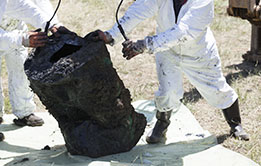I. Introduction
II. Laws, Regulations and Remediation
A. Legal Concepts
1. Types of Law
2. Regulations
a)Federal
B. Laws/Regulations
a) History
b) Objectives
c) Remediation Process
d) Definition of hazardous waste
e) Waste Classification
f) Corrective Action
Week 3:
III. Risk Assessment
A. Introduction
1. Terminology
2. History
B. Steps in Human Health Risk Assessment
1. Data Collection and Evaluation
2. Exposure Assessment
3. Toxicity Assessment
4. Risk Characterization
5. Risk Management
6. Risk Communication
C. Ecological Risk Assessment
D. Risk-based Corrective Action
Weeks 4, 5, and 6:
IV. Remedial Options
A. Introduction
B. Administrative Options
C. Groundwater
1. Plume Containment
a) introduction
b) extraction wells
c) extraction trenches
d) injection wells/trenches
e) wells/barriers
2. Pump and Treat
a) Introduction
b) Contaminant behavior
c) Design considerations
3. Source Control
a) Philosophy
b) Options
4. Permeable Reactive Barriers
a) Introduction
b) Redox reactions
c) Kinetics
d) Design considerations
5. Monitored Natural Attenuation
a) Introduction
b) Evaluation
c) Monitoring
d) Mechanisms
e) Plume Types
f) Lines of Evidence
g) Case Study
Weeks 7, 8 and 9:
D. Soils/Sediments
1. Excavation
a) Use
b) Techniques
c) Control of contaminant transport
d) Typical costs
2. Landfill
a) Hazardous waste landfill
b) Solid waste landfill
3. Containment
a) characteristics of barrier materials
b) alternatives
4. Solidification/Stabilization
a) Introduction
b) Fundamentals
(1) Chemical
(2) physical
c) Leaching
(1) single-component
(2) multi-component
d) Design Considerations
(1) TCLP-based approach
(2) Risk-based approach
5. Chemical Treatment
a) Non-redox reactions
b) Reductive processes
c) Oxidative processes (ISCO)
6. Surfactant extraction
a) Introduction
b) Surfactant properties
c) Configurations
7. Soil Vapor Extraction
a) Introduction
b) Fundamentals
c) Design considerations
Weeks 10 and 11:
8. Bioremediation
a) Introduction
b) Fundamentals
c) Important processes
d) Examples
9. Phytoremediation
a) Mechanisms
b) Examples
Week 12:
10. Thermal Processes
a) Introduction
b) Incineration
c) Thermal Desorption
d) Aqueous Oxidation
11. Soil Washing
a) Introduction
b) Process Description
c) Design Considerations
Books and References
LaGrega, M.D., Buckingham, P.L., Evans, J.C., Hazardous Waste Management, McGraw-Hill, 1994.Haas, C.N.,
Vamos, R.J., Hazardous and Industrial Waste Treatment, Prentice Hall, Englewood Cliffs, NJ, 1995.




Reviews
There are no reviews yet.